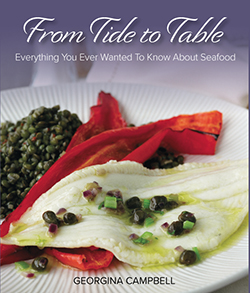Book Reviews
 The Eye of the Ventriloquist by Paul Chatenoud. (Published by Les Cygnes, Paris, price €20; translated from French by Allaye O'Connor).
The Eye of the Ventriloquist by Paul Chatenoud. (Published by Les Cygnes, Paris, price €20; translated from French by Allaye O'Connor).
Memoirs by people who've spent a lifetime working in the hospitality industry are rare enough; and, when they do happen, they're often self-serving which is a great pity, because this is one of the best possible sources of brilliant stories.
Paul Chatenoud is a Frenchman who runs a B&B, near Ardara in west Donegal. Paul has little time for what he calls the ayatollahs who keep us on the straight and narrow, whether it's stopping us smoking too much or drinking to excess.
He's the very antithesis of another kind of Frenchman, the bureaucrat who invented VAT. Paul is an absolute and unyielding Contrarian, which is what makes this book such fun to read and, at times, astonishing. His thoughts range far and wide, from the shallows to the deeps.
Born of French parents and brought up in Morocco, his contrarian views were evident from early on. When he was doing his French military service as a young man, it was the height of the Algerian war of independence.
 Paul became enamoured with the beauty of the then underground Algerian national anthem, and promptly set about teaching it to the young French soldiers under his command. That defiant view of life has remained with him ever since.
Paul became enamoured with the beauty of the then underground Algerian national anthem, and promptly set about teaching it to the young French soldiers under his command. That defiant view of life has remained with him ever since.
Bankers, property developers and the government must be thankful that they've escaped Paul's attention in this book. Most people move on from such contrary views when they leave education and start work. Not Paul, he's been a genuine cultured bohemian all his life, which is what makes his book such fun, a great read.
He starts off by quoting de Valera, who said: "The Irish genius has always placed spiritual and intellectual values above material ones". Paul comments: "Alas, this is no longer true today. The American sirens are quashing the Irish spirit, as they continue to do everywhere else in the world".
From here, it's upwards and onwards all the way through the book. He also quotes Napoleon, who once mused that if he had gone to Ireland instead of Egypt in 1798, England and indeed the world would have been very different.
The book, which was originally published in French and has just come out in English, tells how Paul started what was the first bookshop in Paris to concentrate on books about music.
He's been in Ireland for the past 25 years, and out of financial necessity, turned his cottage in Donegal into a B&B (unregistered, naturellement). He delights in the many strange liaisons of the people who've come to stay there over the years. He mentions one couple who, when asked whether they were married, replied, "Yes, but not to each other".
Another guest is the jinxed type whom every host will recognise: within a few hours of arriving, this lady guest had managed to blow up the water heater; then the heater; and, finally, the bedside lamp...
One 80 year old couple provide a revelation. They are staying with Paul and celebrating the longevity of their marriage with champagne. Paul asks the man his secret and he says: "I did everything I wanted to do". Then the man's wife turns to Paul and whispers: "He did exactly everything I wanted".
He also mentions the wonderful traditional pubs in his locality and the way in which many local drinkers relish their pints, interspersed with shots of whiskey. Paul himself had to reform his ways and hasn't been a drinker for years, as the need for sobriety became essential for his future existence, but that hasn't stopped one of his other great loves, making love to the opposite sex.
He relates adventures with women, many of whom, in the best Gallic tradition, just happened to have been married to other people at the time. The husband of one of his companions once chased him across Paris, threatening to slay him.
He has many deep thoughts about the state of the world and condemns all the modern day "thought police" who try to control what people do, like stopping them smoking. His perverse wish not to have his smoking habits interfered with is a strong element in the book and he relates how one restaurant owner in Dublin told him, before the ban on smoking came in, that the non-smoking tables in the place would fill up by 6.30pm, while the smoking tables weren’t occupied until 9pm.
Clearly, in Paul's view, smokers have a more bohemian view of life, willing to risk it well into the night. "Puritans and self-righteous people have never been associated with creativity", he asserts.
He has many outrageous comments about life in his adopted country, but here's plenty of serious stuff, too. He points out that people in Ireland have one of the highest rates of cancer in Europe and says that this could be partially attributed to people internalising their emotions.
He says that in his locality, whenever there is even a hint of trouble or a problem, people say to him, "Paul say nothing".
Paul has some very strange stories in the book, too, like the one about his 40 year old friend, who died on the very day that his son was born. Exactly the same thing had happened to the man's father when he was born and before that, to his grandfather.
It's an engaging book, that tells much about Paul Chatenoud – who is renowned for his marketing genius. His most recent conquest was Marie Claire magazine in Italy and the current issue has 16 pages on Paul and his B&B. Perhaps he should be advising the Kerry hoteliers, whose current promotional ambition is to get Queen Elizabeth II to visit Killarney - a bit vieux chapeau, Paul would say.
It's a sign of how he is appreciated in France that Le Canard Enchainé (the French equivalent of The Phoenix) is among the many publications giving him approval. His unorthodox approach is great for publicity and even the BBC has fallen for his offbeat charms.
Paul, the eternal spiritual and cultural wanderer, seems to have a certain fascination for buttocks (female, of course), evident throughout the tome. At the conclusion of his book, he talks to a guest who is curious about the sculpture of a buttock, made by a local Donegal artist from bog oak that had been submerged in water for 5,000 years. Paul asks, "How will your buttock be in 5,000 years time?"
That's what you might call a good question, and he asks plenty throughout this provocative work.
Website
----
Reviewed by Hugh Oram






There are currently no comments
Leave a comment
Not a member? Register for your free membership now!
Or leave a comment by logging in with: